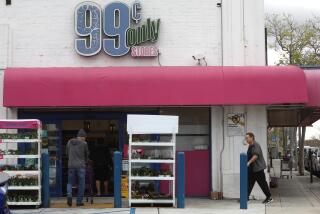Ready to Rock : Guitar Center Going Public, Cranking Up for Nationwide Expansion
- Share via
No longer just a Hollywood landmark, Guitar Center--the nation’s largest retailer of rock ‘n’ roll instruments--is taking its 33-year-old show on the road in an attempt to become the Office Depot of music stores.
With plans for an aggressive nationwide expansion, the Agoura Hills guitar retailer--whose flagship store on Sunset Boulevard is a tourist magnet--will offer stock to the public for the first time.
Today’s offering of shares to raise more than $100 million will make Guitar Center the lone public company in a fragmented retail market that has long been the domain of small, independent stores.
With a reputation among competitors as “a cutthroat discounter”--in the words of Baxter Northrup Music Co. owner Ed Walker--Guitar Center is poised to rock a sleepy industry that had resisted the discount-superstore trend just a few years ago.
Already, Guitar Center is the largest player in that market with 30 stores, mostly on the West Coast, until recent expansions into Michigan, Ohio and Florida.
“They want to go into every major market and completely take over,” said Norm Harris, owner of Norm’s Rare Guitars in Reseda.
Guitar Center was started by former accordion and car salesman Wayne Mitchell, who had a chain of Organ Center stores in Southern California during the early 1960s.
Just after the Beatles visited the United States, one of Mitchell’s suppliers started producing Vox amplifiers and told Mitchell he would have to sell some amplifiers if he wanted to continue to sell organs.
So as a sideline, Mitchell stocked a converted movie theater with Vox amps, and opened it as Guitar Center. Raymond Scherr, a former music products wholesaler, acquired a majority interest when Mitchell died in 1983.
The company expanded to eight stores by 1972 and has continued to grow. With proceeds from its stock sale, the company has ambitious plans to add eight stores this year and eight more in 1998. Until now, the company had never opened more than four stores a year.
Although the company has reported healthy sales--$213 million in 1996, an increase from $170.6 million in 1995--it posted a loss of $72.3 million last year. That loss, coming on the heels of several profitable years, was because of a restructuring and sale of Scherr’s controlling interest to several venture capital firms, including Wells Fargo Small Business Investment, Chase Venture Capital Associates and Weston Presidio Capital II.
*
On Thursday, Guitar Center’s stock was priced at $15 a share by a team of investment bankers led by Goldman, Sachs & Co. Other bankers included Donaldson, Lufkin & Jenrette Securities Corp., Montgomery Securities and Dain Bosworth Inc. Shares began trading today.
Guitar Center, the leader in a $4-billion market, tries to be all things to all rock musicians--”from wannabes to pros,” said Dave Weiderman, director of artist relations for the chain.
Guitars are its bread and butter, but the chain also sells drums, keyboards and sound systems for clubs--in short, a vast array of the paraphernalia that goes with electronic sound. Last year, the company even broke into the vintage guitar market, purchasing a well-known collection.
The Hollywood store is brightly lit and wall-to-wall guitars. Tour buses stop outside at the “Rock Walk,” which enshrines musical innovators and celebrities in handprints like those in front of Mann’s Chinese Theater.
The clientele is mostly male and young. So is the sales staff, which favors long hair--except in the acoustic section, where shirts and ties rule.
These salespeople have an aggressive reputation that sparks frequent comparisons to car dealers from competitors such as Scott Upshaw, the owner of Rack N Roll Music in North Hollywood, who says the company is putting small stores out of business.
Guitar Center’s ability to buy in volume and tie up manufacturers’ capacity gives it a big edge over the small shops that still make up 93% of the market.
“You basically can’t compete with someone like that. They have a lot of buying power,” said Albert Molinaro, owner of Guitars R Us in Hollywood. Molinaro, like others in the business, concentrates on niche markets Guitar Center doesn’t reach.
Upshaw gets Guitar Center’s advertisements in the mail--which he considers a direct affront--and is used to seeing prices listed there that are lower than what he pays his suppliers. “They dictate to manufacturers and make them do special deals that no one can compete with,” he said.
“You want to be a price leader,” Guitar Center’s Weiderman said. “Will manufacturers give you favorable treatment because you buy in volume and you pay bills on time? I think so.”
Elsewhere in the country, Guitar Center’s expansion is being watched apprehensively by smaller dealers. Kevin Fallon, vice president of sales at American Music in Seattle, where Guitar Center will soon open, says some stores there may fall victim.
But he’s hoping Guitar Center has miscalculated. “Musicians are different from mom-and-dad consumers,” he said. “They don’t want to shop at Computer City. In Seattle, they like to go to corner stores and root out equipment and talk to other musicians. A mega-store may not understand that market well.”
*
Guitar Center is not the only chain with the superstore idea. Mark Begelman, former president of Office Depot, started up another giant music store chain in Florida this week, and Hicksville, N.Y.-based Sam Ash Music Inc. is expanding.
Sam Ash is Guitar Center’s biggest competitor. But even Sammy Ash, a Sam Ash senior vice president and grandson of the founder, offered this endorsement: “I plan on buying stock” in Guitar Center, he said.
(BEGIN TEXT OF INFOBOX / INFOGRAPHIC)
Amplified Growth
Guitar Center’s rising sales reflect its growth from a single store in Hollywood to the nation’s largest guitar retailer with 28 locations.
Sales (in millions)
1996: $213.3
Net Income (in millions)
1996: -$72.5
Related to a recapitalization and the repurchase of the controlling interest in the company from the founders.
Source: SEC filing
More to Read
Inside the business of entertainment
The Wide Shot brings you news, analysis and insights on everything from streaming wars to production — and what it all means for the future.
You may occasionally receive promotional content from the Los Angeles Times.










